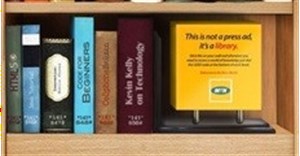The 'Justifying Our Bloody Existence' Loerie
As I understand (and I'm a judge in this Loeries category so I hope to heck I've got this right) an APEX is about the successful business impact of a campaign which may or may not have had an especially creative idea or execution, while the Loerie rewards those campaigns which were awarded first on a stand-alone basis for their creativity and then can be proven to have delivered outstanding results for the client as a result of that innovation.
Actually, the finer points of difference don't really concern me that much because we need both of these awards and any other credible ones we can generate in this space. It should not have escaped the attention of anyone in the industry that we are in a data driven era and we need to constantly prove, as best we can in an imperfect world, that what we get paid to do deserves its slice of the company budget.
I'm afraid the overblown glory of a purely creative award is simply not enough to make that case nor is it sufficient to repeat the well-trodden stat from 'The Case for Creativity' by planner James Hurman that the company which has won the most Cannes Awards has outperformed its competitors on the stock market eight out of ten times in the past ten years. The hungry data monster needs much more food than that.
The new pinnacle of the global awards game
The new Loerie is unashamedly modelled on the Cannes equivalent which was introduced in 2011 and has already become, in my view, the new pinnacle of the global awards game.
An agency can really roar about a Lion if it speaks to both brilliance and bucks. Now it's ditto in the local arena for a Grand Prix.
Just the entry process for these Effectiveness Awards alone is an invaluable tool for gaining focus within the agency. Sure, it's a time-consuming pain in the backside to compile a compelling and crafted factual argument over hundreds or thousands of words rather than just sending off a pretty print ad or a funky TVC to the judges for their creative consideration, but the exercise has a number of spin-offs:
- Come entry time, if business directors cannot find any case studies from within their portfolios over the previous 12 months which have a reasonable shot at effectiveness awards' glory then an agency head might be entitled to ask WTF they have been doing in that time. If every campaign has landed without demonstrable commercial impact then we probably have no value to our clients and soon will be shown the door.
- The agency and the client's marketing department can find common cause in the entry which reflects equally well on both teams rather the arguably more one-sided agency kudos which flows from purely creative awards.
- Planners, who tend to write the entries, gain a much broader understanding of the business problems we are meant to be resolving, and they learn far more about the sharpened mechanics of that business. They also get a crash course in the new kind of economics constructs and models which are increasingly dominating big business conversations.
- As entries evolve in sophistication, planners also learn to work with data in ways that can only benefit the agency as we interpret the marketplace and sell our work back to the client.
- We finally stop retro-fitting "marketing goals" and learn to set them out properly from the start, and then work towards achieving them, rather than pursuing our - often indulgent - internal agendas.
So this new Loerie helps to justify our existence. It's good for agencies and their clients. Let's enter it, support it and aim to produce work that will win it.





